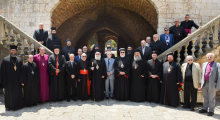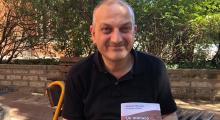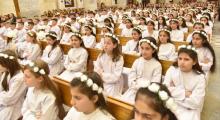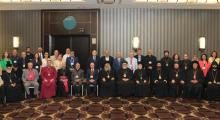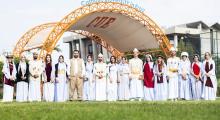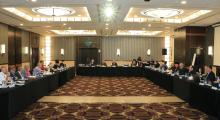Issued by the Catholic Center for Studies and Media - Jordan. Editor-in-chief Fr. Rif'at Bader - موقع أبونا abouna.org
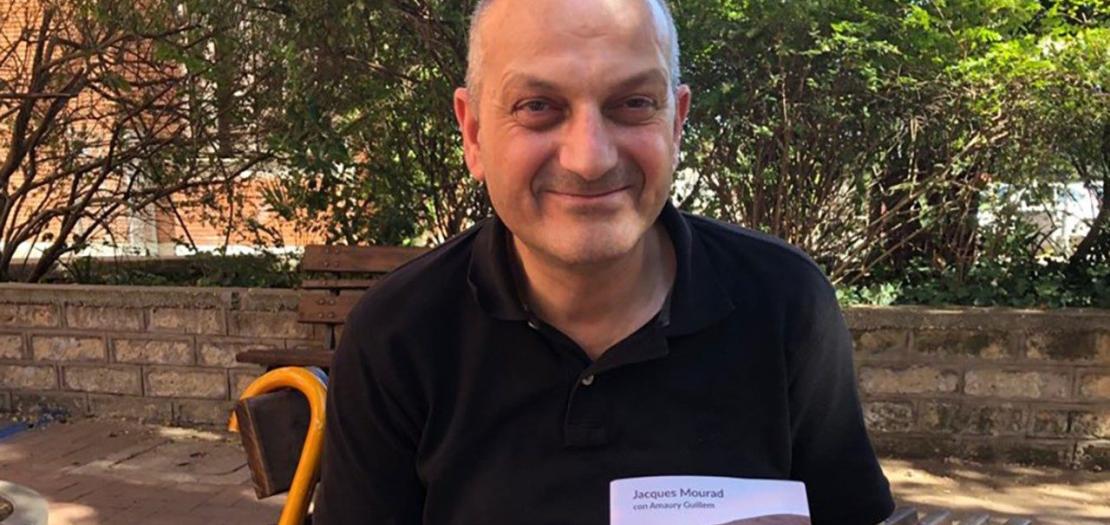
Archbishop Jacques Mourad returned just a few days ago from participating in the Synod of Bishops of the Syriac Catholic Church in Rome. And he had a lot to do after his return to Homs. "These days, I am celebrating the First Communion of boys and girls in the village parishes. This is a joy that touches the heart. We thank the Lord for all these signs of hope that He gives us in our poverty," said Bishop Maurad.
He weighs every word when speaking about the present situation his homeland and its people are currently experiencing. The monk of the Deir Mar Musa community, who was appointed Syriac Catholic Archbishop of Homs, Hama, and Nabek, is particularly moved by the massacre of Christians who were murdered in Damascus on June 22 while they were gathered with their brothers and sisters for Sunday Mass at St. Elias Church.
The words of Bishop Jacques, who was born in Aleppo and joined the monastic community founded by the Roman Jesuit Paolo Dall'Oglio, are at times moving when he speaks about the current situation in Syria.
He reiterates that "Syria as a country is at an end today." But he also recognizes that the Church in Syria must nevertheless continue its path and its work for the good of all. And this, he says, is only happening "because this is the will of Jesus. Jesus wants His Church to remain in Syria. And the idea of emptying Syria of Christians is certainly not the will of God."
The massacre of Christians
The new rulers in Damascus are trying to reassure the people. Even after the massacre at St. Elias's Church, government representatives reiterated that Christians are an indelible part of the Syrian people. "And I would like to say," Archbishop Mourad emphasizes, "that the government bears direct responsibility for everything that has happened. Because every government is responsible for the security of the people. And I'm not just talking about the Christians. Many Sunnis, many Alawites have also been killed, many have disappeared. If a team sent by an international organization were to inspect the prisons, they would find many people who had nothing to do with the crimes of the previous regime. I think it's fair to say that this government is persecuting the people. The entire people."
The Syriac Catholic Archbishop of Homs also sees hostility in the new Syrian regime's toward the baptized: "Every time I hear about 'protecting' Christians, I feel like we're being accused, that we're being threatened. These are words that don't serve to show benevolence; they burden us. I must say that this government is doing the same things the Assad regime did against the population. Both regimes, the Assad regime and the current one, have no respect for the Syrian people and their history."
Syria is at an end
Syria, according to the archbishop, has a great heritage and the presence of its young people. But the latest governments "seem to want to erase, to destroy this civilization, the civilization of this people. This is a global crime; it's not just about us."
"UNESCO has declared so many places in Syria as World Heritage Sites. But no one protects them. And today we must protect our living heritage, not just the monuments."
First loudspeakers, then terror
The acronyms of terror often change their "labels." Syrian government sources have blamed unidentified Islamic State (IS) fighters for the attack on the church in Damascus. However, the massacre of Christians was claimed by a newly formed jihadist group, Saraya Ansar al-Sunna, possibly created by defectors from Tahrir al-Sham.
The Orthodox Christians of St. Elias Church in Damascus—as repeated by several sources and witnesses on the ground—were massacred "as punishment" after some of them had a confrontation with militant Islamists who, with car-mounted loudspeakers, continually drove up to the church, blaring Koranic verses at high volume to call for conversion to Islam. The same thing, Archbishop Jacques confirms, is happening in Homs and throughout Syria: "They drive up in state security vehicles and use loudspeakers to call on Christians to convert. But when we question the security personnel about this behavior, they reply that these are individual initiatives. People no longer believe in this government."
Western sponsors
Meanwhile, those in charge in Syria continue to seek approval from external circles and powers. Government officials have declared that they are ready to renegotiate the 1974 ceasefire with Israel.
"I," Archbishop Mourad admits, "am not a politician. And I see that almost the entire Syrian people want peace. They also want a peace agreement with Israel, for all the countries of the Middle East. After all these years, everyone is really tired of this war and of seeing the Jews as enemies. But if we were to sign an agreement with Israel now, it would only happen because Syria is weak now. And such an agreement, at a time like this, would only be another act of humiliation of the people." "So before the president signs such an agreement," the Archbishop continued, "he should at least speak clearly and unequivocally to the people and explain to them what such an agreement means and what it entails. What the conditions are for Israel and for the Syrians."
The Israeli army, the Syriac Catholic Archbishop of Homs continued, "has occupied many Syrian territories since the end of the Assad regime. This means that we may have to forget the Golan Heights forever. And this means that the Syrian people, especially in Damascus, will always be threatened with the instrument of thirst, because the water in Damascus comes from the Golan. And if we remain dependent on Israel for water, we can imagine other things as well..."
Today, the Archbishop adds, referring to the dramatic situation in Syria: "Syria as a country is at its end. We keep repeating that it is the first country in the world, that Damascus and Aleppo are the oldest cities in the world, but that means nothing today. It is at its end; most people live below the poverty line; we are massacred and humiliated, and we are tired. We don't have the strength to reclaim our dignity ourselves. If there is no sincere political support for the people and not for the government, we are at our end." And: "No one should condemn the Syrian people for emigrating and seeking their fortune outside Syria. No one has the right to judge." And this in a situation where the entire economy, the education system, and even the healthcare system are on the brink.
Where to start again
Is it possible to find ways forward when the horizon is so dark and there seems to be no respite? The Archbishop chooses challenging words to outline the situation and mission of the Syrian churches and Christians today.
"In my opinion," he says, "the Church is the only point of reference for hope for the entire Syrian people. For everyone, not just Christians. Because we are doing everything we can to support our people."
"After the fall of Assad, many in our communities and parishes fell into crisis and fear. A terrible despair. I, too, visited the parishes, in every village, to encourage Christians and speak about the future. Thank God, I feel accompanied by the Lord each time, in the words I speak to the people. And so, in this situation, we are busy organizing regular meetings for young people, for children, for groups involved in the Church in various ways."
Even in a situation that is tragic in many respects, the normal life of the church communities continues. And it is precisely the parishes that, in a torn, painful context, are trying to promote dialogue for the coexistence of all groups and components.
"In Aleppo and also in Damascus, they are truly committed. The bishops have also given lay people space to reflect and take the initiative," the Archbishop said. "In Homs, we are trying to organize meetings with all other communities: Alawites, Ismailis, Sunnis, Christians," he continued. "The people we meet are all concerned about the government's policies, even the Muslims. We are united because we are all in the same boat, as Pope Francis repeatedly said."
The Encounter with Pope Leo
It was Pope Leo who asked the Syriac Catholic bishops to come to Rome to hold their Ordinary Synod in the Eternal City, which took place from July 3 to 6. "It was a wonderful opportunity to meet him, get to know him, and receive his blessing." "I followed his speeches on the Eastern Churches and the Christian East with great attention. I used this meeting to thank him and ask him to encourage the entire Catholic Church to take the initiative to support the Syrian people, in particular, in their basic needs."
Hope is reflected in concrete works
"For me," Jacques Mourad emphasizes, "it is important that the Church work intensively on the reconstruction of schools and the entire education system in Syria." We already have schools in Aleppo and Damascus, but they are not enough. In Homs there is nothing. We must work on this, because it can also help curb Christian emigration. All parents think about the future of their children. And if they cannot guarantee them schools where they can learn and functioning hospitals, their only choice is to leave."
"We need everything. We must also revitalize pastoral and cultural centers that can accompany the human and cultural growth of our young people. And also houses for young people who want to get married. In this way, we can encourage all young people to stay in the country and not leave," the Archbishop emphasizes. Resources are lacking, but the horizon is clear: "And this is how we can advance on the path of our Church in Syria. Because that is certainly the will of Jesus. Jesus wants his Church to remain in Syria. This idea of emptying Syria of Christians is certainly not the will of God," he affirms.
"And we, the disciples of Christ and those who bear responsibility in his name, have, first and foremost, the duty to protect our faithful and do everything possible to ensure the future of the Church in Syria," he concluded.


